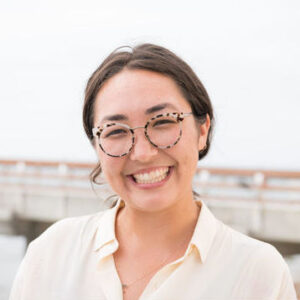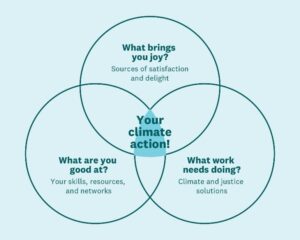 By Lisa Bortner
By Lisa Bortner
Adrienne Elliott, pictured right, works for the Diocese of Olympia in Western Washington as the Program Coordinator for Multicultural Ministries & Community Transformation, which also includes Creation Care. In 2022 she finished her Master’s in Climate Science and Policy at Scripps Institution of Oceanography. Beyond the work she does for Olympia, she is also involved with the Diocese of San Diego’s Creation Care Community. Adrienne is passionate about intersections of environmental justice, grassroots organizing and activating the church for partnership with the wider community.
Adrienne addressed the attendees of the “It’s All About Love” Festival as a participant of the Tuesday morning plenary that focused on Creation Care. Adrienne was one of three “Young Voices for Climate,” and the recording of their session can be found at: episcopalchurch.org/its-all-about-love/. During her presentation she focused on the importance of vocation, as reflected in this adaptation:
To start with her own vocational journey, she recalled her first feeling of climate anxiety in a high school environmental class as the severity of the climate emergency and its devastating impacts truly sank in. Unfortunately, her passion and despair were met with no resources or onramps for faithful engagement at her nondenominational church.
Reflection #1: What are you doing in your life and in your parish to welcome and support young people (and folks of all ages!) who feel the weight of this crisis? What does listening, pastoral care and communal invitations to lament and action look like?
Thankfully, since high school, Adrienne has found that her faith not only has a lot to offer this conversation—she believes our movement on Creation Care and all the relationships it invites us to reorient are crucial to healing our church and our communities and accounts for much of the harm that Christianity has wrought—write large!
In her first year of university, Adrienne learned the term vocation, which can be thought of as “the place God calls you…where your deep gladness meets the world’s deep hunger” as taken from Frederick Beuchner. This intersection transformed her understanding of who she was in relation to the collective and became a tool to discern where her energy and time should go, even beyond what she did for work. Adrienne’s love for the Episcopal Church also grew when she learned how vital vocational discernment is in our formation as the ministry of the baptized. “In listening to my life, I’ve found that my “vocational lane” is somewhere in the realm of racial, economic and climate justice and care for our communities enacting such justice,” explains Adrienne. Here are a few quick snapshots of what that’s looked like for her:
- studying eco-theology at university
- growing food for redistribution in urban gardens with her church and at the Presbyterian church she worked for
- co-founding an upcycled scrunchie company
Adrienne emphasized the importance of faith communities supporting young people’s interests and talents by providing access to decision making and onramps for involvement but doing this intentionally. After college, she was over-involved in church and totally burnt out.
Reflection #2: How can we support enthusiastic young people (and especially our young folks of color) to grow in the life of the church without taking on too much?
Adrienne thinks it starts with modeling healthy boundaries and the Sabbath, creating a culture of teamwork and identifying power dynamics present in the responsibilities of life and ministry together. We can’t afford to burn young people out by overburdening them with responsibility and unpaid labor while leaving them without spiritual care or support from folks with more free time and wealth. Regardless, after spending time in a mutual discernment group (which we all should do), she moved back to San Diego to be closer to her family and to pursue a graduate program to see the climate science, solutions and political realities for herself and to communicate it with her community (that’s us!). And well, it’s not looking great, folks. She was privileged to study Climate Science and Policy, and while it was amazing and horrifying to hear from renowned experts at Scripps Institution of Oceanography, as many of you have smartly figured out, you don’t need to go to graduate school to know that all we have to lose is, well, everything.
Currently, we are on track globally to experience 2-3 centigrade of warming (or 3.6-5.4 Fahrenheit) by 2100 without massive change in every sector. These impacts will not be felt equally, as our most vulnerable frontline communities can already attest to. As her program director shared after listing the cascading effects of climate breakdown and chaos, “It’s not the impact that’s going to get us, it’s the fall.” How will we as a world, as a human family, deal with the global and local fallout that comes with “unprecedented” surges in sea levels, storms and droughts; geopolitical competition over collaboration; and a climate refugee population of 1.2 billion by 2050? The record-breaking heat waves of late and the disparity in media coverage are not super hopeful indicators.
So, without getting too doom and gloom, let’s talk about how we can faithfully show up and act. Caring for God’s good Creation means loving all of it. Creation care and climate justice encompasses: food systems; energy transitions; ecosystem and habitat protection; compost and waste; equitable access to education; public investment in green jobs and industry; environmental health; Indigenous/First Nations sovereignty; racial justice and reparations; curbing corporate power; protecting voting rights; and so much more. It effectively asks us to reimagine a world that is more loving, liberating and life-giving. With so many things that need doing, Adrienne believes vocation is a great place to start, or to come back to if you are already active in this space.
 Some of us may know the brilliant oceanographer and policy enthusiast, Dr. Ayana Elizabeth Johnson, who launched a first-of-its-kind urban ocean policy lab and co-created the podcast “How To Save A Planet.” One of Adrienne’s favorite resources from Dr. Johnson is the Climate Action Venn exercise.
Some of us may know the brilliant oceanographer and policy enthusiast, Dr. Ayana Elizabeth Johnson, who launched a first-of-its-kind urban ocean policy lab and co-created the podcast “How To Save A Planet.” One of Adrienne’s favorite resources from Dr. Johnson is the Climate Action Venn exercise.
So, let’s take a look. And remember, you can reframe the “you” to “your parish”:
- “What are you good at? Think about your skills, resources and networks. What are your areas of expertise? Who and what do you have access to? What can you bring to the table?
- What is the work that needs doing? Think about system-level change. Are there particular climate and justice solutions that interest you? Maybe it’s starting a composting program, protecting forests, or getting climate candidates elected.
- What brings you joy and satisfaction? What gets you out of bed in the morning? Don’t pick things that make you miserable and will burn you out! This is the long haul – find things that enliven and energize you.”
Dr. Johnson says, “The goal is to be in the heart of your Venn diagram, where these three circles overlap, for as many minutes of your life as you can. That will create way more progress on climate solutions than if each of us gets sucked into obsessing about our individual carbon footprints.” Getting to the heart of your Venn…sounds almost exactly like the place where our deep gladness and the world’s deep hunger meet, right? Using this tool in our personal lives and with our parishes can help us discern where God may be calling us. Adrienne invites us to take this exercise home to our churches and to listen deeply to your neighbors’ needs and assets.
Here are a few examples to illustrate. Maybe your church has a space with AC or a pre-existing ministry and network related to Creation Care, homelessness, or seniors. Your parish might find great joy in partnering with your community to fill tangible needs and building climate resilience. And, there is a very real and increasing need to provide respite from severe heat as we continue to break local and global temperature records, shocking even climate scientists recently amidst an El Nino period of increased temperatures and drought (and still increased fossil fuel use and investment). With all that in mind, cooling centers might be at the heart of your Venn as they offer folks (and sometimes pets) the space to get relief from the heat during the day and hopefully into the evenings. For our friends over 60 who hold the majority of wealth, maybe your climate action is to partner with organizations like 3rd Act to move your money, your church’s money, your diocese’s money and the Episcopal Church’s money out of banks that invest in fossil fuels and into banks that invest in pro-climate, not just carbon-neutral. Or, maybe your climate action is tending to your parishioners, neighbors and friends’ climate grief, anxiety, lament…and hope. This is especially important for young people who increasingly calculate climate chaos into big decisions like where they live and work, and if they’ll have kids. We can offer a safe space and even liturgy or other spiritual accompaniment to process these feelings and transform them into communal care and action.
In conclusion, Adrienne encourages us to move our book clubs into climate action and advocacy. Get out of our heads and into our hearts, into our bodies…and into our communities! Again, this climate emergency is going to take every one of us discerning which waves to make in the sectors and web of community that we inhabit. As young people and the rest of the world ask some really tough and existential questions about our shared future and what needs to be re-imagined, Adrienne hopes we can be in the conversation and meet the moment. Hope is a precarious word in this space and often, all we can do as people of faith is show up and embody it.
